|
History
Phonecards were first invented in Italy in 1975
and were introduced to the public in 1976 to prevent payphone vandalisation.
They became very popular throughout Europe. In 1982 the predecessor of the
Nippon Telegraph and Telephone Corporation (NTT) began doing trials in Japan. Aussie Bowl 86 and 87
In 1986 the VFL played an exhibition Match
in Tokyo. Hawthorn 22.17 (149) defeated
Carlton 13.18 (96). Two Japanese university teams,
Keio and Waseda, played a curtain raiser
prior to the match.The following year 1987,
Hawthorn 20.14 (134) defeated Essendon 11.9 (75).
|
|
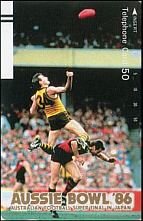 |
|
In 1986 NTT produced three "Free Design" Cards
to commemorate the match.These
are private edition cards whose design is provided by the customer. They are
often used by companies as advertising cards, and can be identified by the
code numbers on the back, which are prefixed with the Japanese word for "free" ( "furii") followed by the regional branch number (three digits), a
dash and the card number. Holes are punched along
the top of the card to indicate the approximate number of units remaining.
The cards were produced by the
Tamura Plastic Corporation and the 1986 cards were printed with a
white area in the lower left-hand corner with two, three or more black
stripes corresponding to the card's denomination. eg 2
stripes for 50.
In 1987 one card was produced.
This card has the white bar
removed and the stripe is printed on the
card's reverse. |
|
|
|
The design of the other cards, apart from
the one illustrated above, were
1986 Aussie Bowl
(portrait),
1986 Aussie Bowl
(landscape)
and
1987 Aussie Bowl.
A third card with
a landscape orientated image was also produced in 1986.
Telearch and Telecom |
|
Phonecards were first introduced to Australia
with the Geelong trials in 1989. They were magnetic cards produced by the
Anritsu Corporation, but no
magnetic stripe is visible. In fact the entire
backs contain the magnetic encoding and only one side
can be printed in colour, while the back is usually silver. In 1994 Telearch (later to become Cardphone)
issued four commemorative magnetic strip cards that were for use in Telecom's
(later to become Telstra) Payphones. They were issued in A4 illustrated folders.
The initial player was Geelong Champion
Gary Ablett, shown at right. This was followed by Adelaide pinup boy
Tony Modra,
the West Coast Eagle,
Chris Mainwaring
and Carlton Champion,
Stephen Silvagni.
Cardphone Australia |
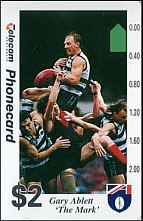 |
|
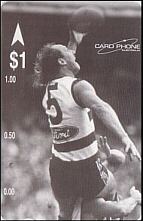
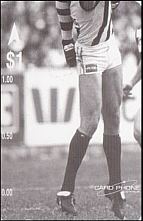 |
As Cardphone had the rights to AFL images on
phonecards it issued a $20 card of
Wayne Carey.
The cards were magnetic strip cards ? of the Tamura
type. Cardphone had only limited phones at Victorian Race Courses so
the sale of cards to collectors was very important.
This was followed by a Limited Edition 1985
AFL Captains Series which was housed in an UltraPro Album and
included a double jigsaw card of Gary Ablett's Mark of the Century,
shown at left.
Captains Series |
|
|
The 1995 Premiership was easily won by Carlton over Geelong. A
$5
and $20 card of the same design as below was issued. |
|
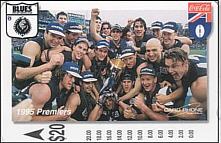 |
|
|
|
1996 was the Centenary year of the AFL.
Cardphone released a four card set of Black and White Images of past Champions.
These included
Ted Whitten,
Leigh Matthews,
Graham Farmer
and
Alex Jesaulenko.
1996 also saw the advent of Remote Memory
Cards. The card itself is not inserted in the telephone.
The system is based on a central
computer and each card purchased has a predetermined value which is stored on
the computer, and not in the card itself, as is true with the other types of
cards. The card owner calls a toll-free number and, following instructions given
by a voice prompt, dials his personal identification number (or PIN), usually
printed on the back of each card and protected in some way, like under a coating
of scratch-off material, or visible on the card, which in turn is protected
within a sealed envelope. Dialing the PIN, the computer is alerted to identify
the card so that it can determine how much value and phone time remains on it,
and the voice prompt then instructs you to call the number of the party you are
seeking. Calls made in this way are usually cheaper
than standard credit card or coin calls, because you don't have to pay access
fees, surcharges, billing charges, operator expenses, etc.
(as per
All Cards Site)
1996
Centenary Series |
|
|
Late in 1996 Cardphone released a Remote Memory Card to mark the amalgamation of
Fitzroy and Brisbane. Its last magnetic strip card shown below may never have
been released. |
|
|
Telstra AFL Club Collector Series
In 1997 Telstra commenced doing trials with smart
cards containing a silicon chip. This necessitated the changing of their
approximately 4000 payphones to read the new technology. In 1998 they released
the Club Collector Series for 13 of the 16 clubs. The other three clubs,
Carlton, Collingwood and Port Adelaide had sponsorship with alternative Telcos. Each card had a cardboard stand. |
|
|
Primus Telecom
In 1999 Primus Telecom produced the first of a a series
showing
Spider Burton.
They also released a series of four
cards to commemorate the retirement of Tony Lockett. Two cards were from his St
Kilda days with value of
$10.00
and
$20.00
and two cards were from his Sydney days with value of
$10.00
and
$20.00 |
Stadiums
AWC Communicaations released a $25 dollar card of
the
MCG
with a
game
in progress on the tab.
Austpac International Inv Group released two cards of the 2000 Olympic Stadium
by
Day
and by
Night. |
Unidial
Herald Sun Series
In 1997 the Herald Sun issued two series of Remote
Access Phonecards showing various aspects of their industry. Two of the cards
had a football theme, one showing a
handball
and the other showing
an umpire.
Redicall Western Bulldogs Card
In 1997 the Western Bulldogs issued a fund raising Remote Access Phonecard
in conjunction with
Redicall,
who were latter taken over by Unidial.
|
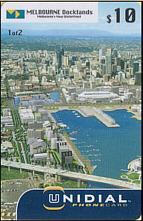 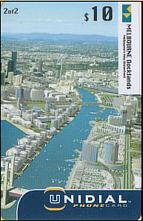 |
Melbourne Docklands
As part of the Docklands Development, Unidial
issued 2 cards showing the Docklands Stadium (Telstradome) and surrounding
Development..Port
Adelaide
The Port Power Foundation Ltd issued at least on Remote Access Card as a
fund raising initiative. It showed
Tim Ginever
and Alberton Oval on the front of the card. Tim was a long
time captain of Port's SANFL club. |
|
Since 2003, Unidial has released four series
of three cards commemorating AFL Footballers.
Wayne Carey's 250th Game.
Carey's 250th Game was commemorated by the release of a $5.00 card (below), a
$20.00
card and a
$25.00
card.
Jason McCartney
Jason McCartney, who suffered life threatening burns i
the Bali Bombing made a triumphant comeback for one last game on the 6th June
2003. This was commemorated by the release of a $5.00 card (below), a
$10.00
card and a
$20.00
card.
Mark Ricciuto
Mark Ricciuto, Adelaide Captain, had a great 2003 being a joint winner of
the Brownlow Medal. This was commemorated by the release of a $5.00 card
(below), a
$10.00
card and a
$20.00
card. |
|
|
Nathan Buckley
Buckley had a great 2003 being a joint winner of the Brownlow Medal. Unidial,
through the Supersaver Phonecard Brand, issued three $10.00 cards to commemorate
his season. They represented Buckley as
Collingwood Captain,
Brownlow Medalist
and
Hall of Fame.
Coles Myer Gift Cards
In 2006 Coles Myer released a set of gift cards with the logos of the AFL
Clubs. |
|
|
2006 Commonwealth Games
Telstra released two cards showing the
MCG with values of
$3.00
and
$20.00. |